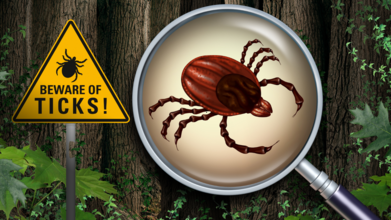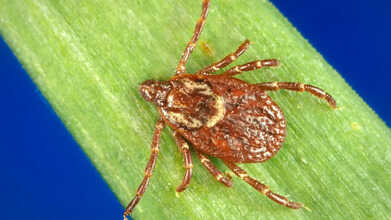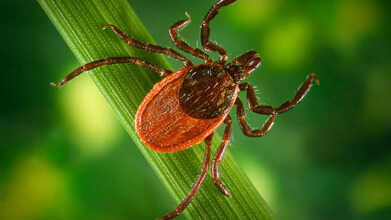- Health Conditions A-Z
- Health & Wellness
- Nutrition
- Fitness
- Health News
- Ayurveda
- Videos
- Medicine A-Z
- Parenting
- Web Stories
Oxytocin Is More Than Just A 'Love Hormone', All About Its Effects On Body

Image Credit: Canva
Oxytocin, often referred to as the "love hormone," has been touted for ages as the hormone that facilitates romance and attachment between parents and children. While this powerful neurotransmitter plays a role in these very important areas, its simplicity is far from the depth of its complexity. From stress response to social behaviors, to even medical treatments, oxytocin is the linchpin in numerous physiological and psychological processes.
What exactly is Oxytocin?
Oxytocin is both a hormone and a neurotransmitter that is produced in the hypothalamus, which is a small but essential area of the brain located at its base. It is secreted by the pituitary gland, affecting many different systems throughout the body. Its most well-known function is its role in reproduction, facilitating labor in women and assisting sperm movement in men.
But oxytocin’s reach extends far beyond reproduction. Found in cells across the body, oxytocin interacts with other key neurotransmitters, such as dopamine and serotonin, often referred to as the "happy hormones" Together, these chemicals shape our emotions, behaviors, and overall well-being.
Oxytocin and Its Role in Love
Many studies have supported the connection between oxytocin and love. The most notable of these was the 2012 study when scientists found that oxytocin levels significantly rose in couples at early stages of a romantic relationship than in single individuals. In couples who remained with their partners for more than six months, the increased levels stayed up, indicating that oxytocin has a place in long-term attachment.
Oxytocin also plays a critical role in sexual activity, making the orgasm more intense and intimate. It helps in creating feelings of trust, empathy, and good memories, which are important elements for a strong foundation in relationships.
Relaxation from Stress and Pain Management
Oxytocin's effects are not limited to emotional bonding; it is also a key player in stress relief. A 2021 study found that oxytocin levels start to increase even before the onset of stress-causing events, such as exams, as the body prepares itself to cope with increased cortisol levels. In this regard, oxytocin is a natural buffer during mental strain.
Additionally, oxytocin has been proven to produce pain relief and is hence an area of potential therapeutic application in conditions characterized by chronic pain or intense stress.
Labor, Breastfeeding, and Maternal Bonding
Oxytocin's most widely known role is that of its function in delivery and breastfeeding. Oxytocin levels surge during labor, enhancing the uterine contractions that will deliver the baby. Medical science has also used synthetic oxytocin, often referred to as Pitocin, to initiate or enhance labor.
Just as essential postpartum, the hormone stimulates milk letdown and deepens the maternal bond between the mother and her infant.
Social Bonding and Altruism
It has often been called the "social glue" because of its intense effect on human behavior. Many researches have indicated that oxytocin boosts our ability to empathize, trust, and bond with others. All these social behaviors are integral for building communities and fostering relationships between people.
Oxytocin also seems to impact generosity and altruism. According to research by the American Psychological Association, oxytocin seems to promote selfless behaviors and therefore strengthens its role in fostering a more cooperative and compassionate society.
Applications of Oxytocin
Oxytocin's medical potential is wide and still being explored. It has more than labor induction as its promise in treating developmental and psychiatric disorders. A 2017 study pointed out the benefits of oxytocin in managing autism spectrum disorders and other conditions that impair social interaction.
Researchers are also investigating the use of oxytocin as a treatment for postpartum depression. Some of the findings are mixed, though: a few studies indicate synthetic oxytocin may cause more anxiety and depression among new mothers. The science is also looking at the use of oxytocin to help with substance abuse disorders and possibly be an alternate option for those suffering through addiction.
Oxytocin's Complex Interplay with the Body
The effects of oxytocin on the body are complex and multifaceted, arising from its interaction with neurotransmitters such as dopamine and serotonin. When you feel attracted or in love, oxytocin, dopamine, and serotonin combine to build up a positive feeling of bonding.
The impact of oxytocin reaches into numerous physiological processes, including:
Cilia Function in the Respiratory System: Oxytocin helps move the cilia, which are short hair-like structures, that aid in ridding the respiratory tract of pathogens.
Immune System Support: It contributes to stress response regulation. Stress response is a potential modulator of immune function and hence of health.
While oxytocin is often romanticized as the “love hormone,” its contributions to human health and behavior are far-reaching. From aiding childbirth to fostering empathy and reducing stress, this hormone underpins many aspects of daily life.
Understanding the complexities of oxytocin reveals the intricate interlocking systems that govern the body. Oxytocin will continue to surprise in what its full use is; perhaps it has something crucial to say about mental disorders, social disorders, even chronic illness.
By nature, oxytocin is more than the "hormone of love." It's the hormone of connection, healing, and indeed humanity.
The Role of Oxytocin and the Effect of Stress During Childbirth. Frontiers. 2021.
Oxytocin during the initial stages of romantic attachment: relations to couples' interactive reciprocity. Psychoneuroendocrinology. 2012
Could intranasal oxytocin be used to enhance relationships? Curr Opin Psychiatry. 2013
6 Scary Symptoms ER Doctors Say You Should Never Brush Off

Credits: Canva
We have all been there, done that. Reaching out to Google every time we face slight discomfort sneezing, convinced that we have some serious disease. While not every ache or tickle means an emergency, some symptoms really do need urgent attention. According to ER doctors, there are a handful of red flags you should never brush off.
Here are six warning signs you should pay attention to immediately.
1. Chest Pain That Feels Super Heavy
We have all had heartburn after a cheesy pizza, but chest pain is not something to gamble with. Reports say crushing, pressure-like chest pain that radiates to your arm, jaw, or back is a huge red flag for a heart attack. Sometimes it comes with sweating, shortness of breath, or nausea. Even if you are young and otherwise healthy, do not assume it is just gas or stress. When in doubt, get checked out; it is always better to be told it is heartburn than to ignore a heart attack.
2. The Worst Headache of Your Life
Sure, headaches are common, but if you suddenly feel like someone is hammering your skull with no mercy, do not tough it out. According to the reports, a sudden, severe headache, especially if it is different from your usual migraines, could signal a brain aneurysm, bleeding, or other neurological emergency. Pair that with vision changes, weakness, or slurred speech, and you should be calling for help immediately.
3. Unexplained Shortness of Breath
Running up the stairs and wheezing like a deflating balloon is one thing. But struggling to breathe at rest or without any exertion? That is a whole different story. Experts say unexplained shortness of breath could point to conditions like blood clots in the lungs, asthma attacks, pneumonia, or even heart problems. If your chest feels tight, you are gasping for air, or your lips are turning blue, it is not something to “walk off”.
4. Sudden Weakness or Numbness in One Side of the Body
If you are holding something, and suddenly it slips right out of your hand because your arm has no feeling. Or half your face feels like it is melting. These are classic stroke symptoms, and ER doctors stress that time is everything. The quicker you get treatment, the higher the chances of recovery. Remember the acronym FAST: Face drooping, Arm weakness, Speech difficulty, Time to call emergency services. Do not wait it out hoping it will pass.
5. Uncontrolled Bleeding
A paper cut? No big deal. A deep cut that refuses to stop bleeding after 10 minutes of firm pressure? That is a medical emergency. According to the reports, that uncontrolled bleeding can mean a damaged artery or an underlying clotting disorder. If you are soaking through bandages or the blood will not stop, it is not something to ignore. Plus, losing too much blood too quickly can lead to shock and nobody wants to faint in their bathroom.
6. Severe Abdominal Pain That Comes Out of Nowhere
Stomach aches are often brushed off as bad food choices. But if you suddenly develop intense abdominal pain that does not go away, reports suggest it could be something much more serious, like appendicitis, gallstones, a perforated ulcer, or even an intestinal blockage. The kind of pain where you cannot stand up straight or move without wincing is not the “sleep it off” kind. Trust your gut, literally, and get checked.
Listen to Your Body’s Alarm Bells
Not every symptom is an emergency, but when your body loses it, it is trying to tell you something. ER doctors agree that ignoring these signs can lead to complications that are far harder to treat later.COVID-19 Shot Recommendations Children 6 Months to 2 Years Should Be Vaccinated, AAP Diverges From CDC Advice

(Credit - Canva)
The discourse surrounding vaccinations has been rampant in the past few years. Many people are questioning the validity of vaccines and why they need to have them. This becomes much more complicated when it involves children. Parents have expressed their concerns and whether their immune systems can handle vaccines. This is why we turn to recommendations by health organizations such as AAP and CDC, however, their new guidelines on the same are now clashing.
The American Academy of Pediatrics (AAP) has released new recommendations stating that all children ages 6 to 23 months should receive a COVID-19 vaccine. This guidance is part of the AAP's annual childhood immunization schedule and includes recommendations for COVID, flu, and RSV vaccines for those 18 and under. This advice from the AAP stands in contrast to recent guidance from federal health officials.
How Are These Different From Federal Guideline?
The AAP's recommendation comes after Health and Human Services Secretary Robert F. Kennedy Jr. announced that the Centers for Disease Control and Prevention (CDC) would no longer recommend the COVID-19 vaccine for healthy children. The CDC has since updated its guidance to a "shared clinical decision-making" model, which leaves the choice to vaccinate up to parents and their doctors. This difference in opinion highlights a growing disagreement between federal health officials and medical organizations on vaccine policy.
ABC news reports that AAP's president, Dr. Susan J. Kressly, stated that children between 6 and 23 months old are at the highest risk for severe COVID-19. She emphasized that the vaccine can protect these young children, many of whom were not exposed to the virus during the pandemic and therefore have no natural immunity. The AAP aims to provide clear and confident guidance to families who rely on them for medical advice, especially in a time of widespread misinformation.
How Does This Impact Vaccine Coverage?
While the AAP provides its own recommendations, insurance companies often follow the guidance of the CDC's vaccine panel. If the CDC's Advisory Committee on Immunization Practices (ACIP) does not recommend a vaccine, it could lead to families having to pay for the shots out-of-pocket. It could also mean the shots aren't covered by the Vaccines for Children (VFC) program, which provides free vaccines to eligible children. The AAP is in talks with insurance companies to ensure that vaccines remain accessible as a part of standard preventive care.
Has Vaccine Skepticism Affect People’s Health?
The world is seeing a worrying increase in diseases that were once rare because of vaccines. GAVI, vaccine alliance, explains that this is threatening decades of public health progress and putting millions of lives at risk. In places like the United States and Canada, vaccination rates are dropping, leading to a rise in cases of diseases like measles. This problem is largely driven by the spread of false information about vaccines.
The children in this study were born during or after the start of the COVID-19 pandemic, which caused major disruptions to routine medical care. To help fix this problem, doctors should check a child's vaccination history at every visit and strongly recommend the necessary shots. To increase vaccination rates and protect all children from preventable diseases, experts suggest:
- Making it easier to get vaccines by removing financial and access barriers.
- Fighting vaccine hesitancy and the spread of false information.
- Using tools like reminder systems and strong recommendations from doctors to encourage parents to get their children vaccinated.
Which Ticks Are Living Around You?

Credits: Canva
As the temperature rises, the rise in tick-borne disease are also being reported. When you think about ticks, you probably think about Lyme disease or the general unease of finding one clinging to your skin.
However here’s an important fact: just because a certain tick species is found in your area doesn’t automatically mean it spreads a specific disease there. Disease transmission depends on several factors, from local ecology to host availability, not simply the presence of ticks.
Still, understanding which ticks are in your region helps you stay alert to potential health risks.
Below is a guide to the major tick species in the United States, what they look like, where they’re found, and the diseases they may carry.
American Dog Tick (Dermacentor variabilis, D. similis)

Where found:
As per the Centers for Disease Control and Prevention (CDC), the American dog tick is common east of the Rocky Mountains and in some western pockets. A related species, D. similis, lives west of the Rockies.
What it transmits:
These ticks can spread tularemia and Rocky Mountain spotted fever (RMSF).
READ: First Rocky Mountain Spotted Fever Case Confirmed In Quebec
What to know:
Spring and summer are peak seasons for bites, with adult females being the ones most likely to latch onto humans.
Asian Longhorned Tick (Haemaphysalis longicornis)

Where found:
CDC notes that it was first detected in the U.S. in 2017. This invasive species has spread quickly. As of 2024, it has been reported in at least 19 states, including New York, Virginia, North Carolina, and Kentucky.
What it transmits:
In Asia, these ticks are known to spread pathogens that can make humans and animals seriously ill. In the U.S., their disease-spreading potential is still being studied. While they are less likely to bite humans compared with native ticks, they can carry bacteria that cause Rocky Mountain spotted fever, though this hasn’t been found naturally in U.S. populations yet.
What to know:
These ticks reproduce without mating, meaning a single female can produce thousands of offspring. They’ve been found on pets, livestock, wildlife, and even people, often appearing in large numbers in grassy or shrubby areas.
Blacklegged Tick (Ixodes scapularis)

Where found:
CDC notes that this is common across the eastern United States.
READ: Justin Timberlake Reveals Lyme Disease Diagnosis: Here’s What That Means For His Health
What it transmits:
This tick is one of the most medically important in the U.S., spreading multiple diseases, including:
- Lyme disease (Borrelia burgdorferi and B. mayonii)
- Anaplasmosis (Anaplasma phagocytophilum)
- Babesiosis (Babesia microti)
- Ehrlichiosis (Ehrlichia muris eauclairensis)
- Powassan virus disease
What to know:
The risk of bites is highest in spring, summer, and fall, but adults can be active anytime winter temperatures rise above freezing. Nymphs and adult females are the main culprits when it comes to human bites.
Brown Dog Tick (Rhipicephalus sanguineus)

Where found:
It is truly a global traveler, this tick is found worldwide and throughout the U.S.
What it transmits:
In certain parts of the U.S., especially the Southwest and along the U.S.-Mexico border, it can spread Rocky Mountain spotted fever.
What to know:
Dogs are the preferred hosts at every stage of their life cycle, but they can also bite humans. Because of their close association with dogs, they often infest kennels, homes, and even veterinary clinics.
Gulf Coast Tick (Amblyomma maculatum)

Where found:
Primarily in the southeastern U.S., with isolated populations in other regions such as the Midwest and Southwest.
What it transmits:
The main disease linked to this tick is Rickettsia parkeri rickettsiosis, a type of spotted fever.
What to know:
Adults are most often involved in transmitting pathogens to humans.
Lone Star Tick (Amblyomma americanum)

Where found:
This aggressive biter is found widely in the Northeast, South, and Midwest.
What it transmits:
Lone star ticks are linked to several diseases and unusual health effects, including:
- Human ehrlichiosis (Ehrlichia chaffeensis and E. ewingii)
- Tularemia
- Bourbon virus
- Heartland virus
- Alpha-gal syndrome (a surprising tick-related allergy to red meat)
- A rash sometimes called STARI (Southern Tick-Associated Rash Illness)
What to know:
Adult females can be recognized by a single white dot, or “lone star”, on their back. Their bites can cause skin irritation even without infection. Nymphs and females are most likely to bite humans.
Rocky Mountain Wood Tick (Dermacentor andersoni)

Where found:
Lives in the Rocky Mountain states and parts of southwestern Canada, mostly at elevations between 4,000 and 10,500 feet.
What it transmits:
Known carriers of Rocky Mountain spotted fever, Colorado tick fever, and tularemia.
What to know:
Adult ticks are the primary stage that transmit diseases to people.
Western Blacklegged Tick (Ixodes pacificus)

Where found:
It is found along the Pacific Coast, especially in northern California.
READ: Family Shares How A Lyme Disease Misdiagnosis Cost Their Son's Childhood
What it transmits:
This species can spread:
- Lyme disease (Borrelia burgdorferi)
- Anaplasmosis (Anaplasma phagocytophilum)
- Hard tick relapsing fever (Borrelia miyamotoi)
READ MORE: Lyme Disease In US: How Worried Should You Be Of Ticks?
What to know:
Although all stages can bite humans, nymphs and adult females are most frequently reported on people.
Staying Tick-Smart
While different ticks pose different risks, the best prevention steps remain the same:
- Use insect repellent containing DEET, picaridin, or permethrin-treated clothing.
- Wear long sleeves and pants in grassy or wooded areas.
- Perform regular tick checks after outdoor activities.
- Check your pets, too, dogs and cats often bring ticks indoors.
Photos of ticks taken from CDC Website
© 2024 Bennett, Coleman & Company Limited

